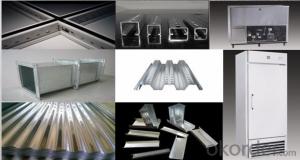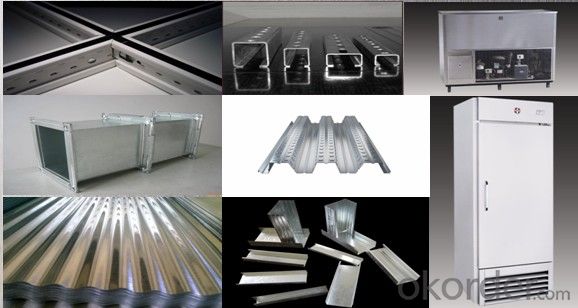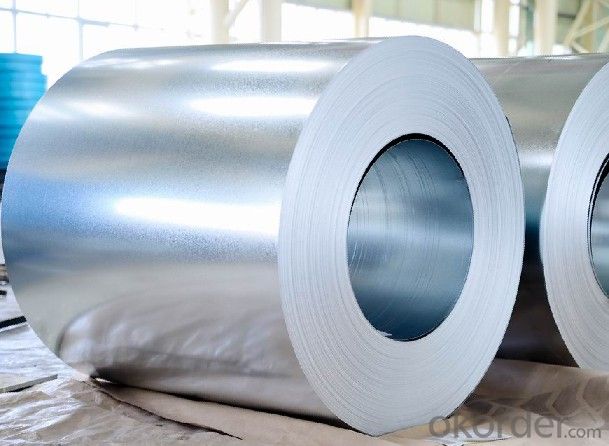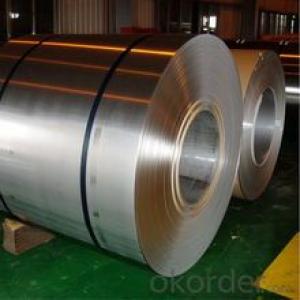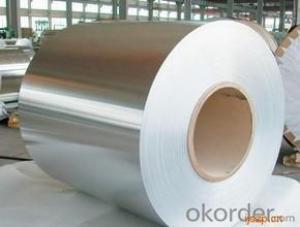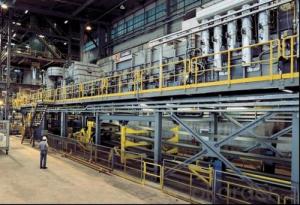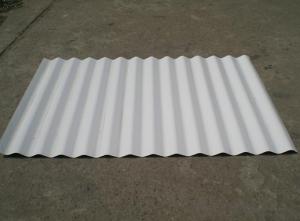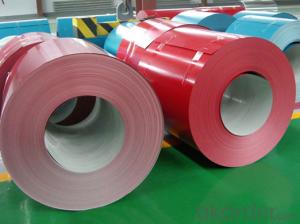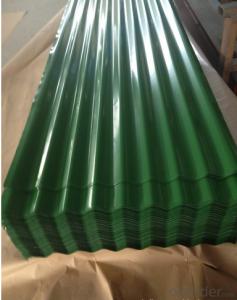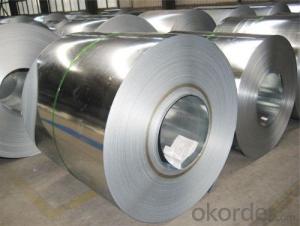Hot DIP Galvanized Steel Coils Regular 1000mm 1200mm 1250mm
- Loading Port:
- China main port
- Payment Terms:
- TT OR LC
- Min Order Qty:
- 25 m.t.
- Supply Capability:
- 1000 m.t./month
OKorder Service Pledge
OKorder Financial Service
You Might Also Like
Product Description
Description:
EN 10147 Structure hot dip galvanized steel coil S250GD+Z, S350GD+Z (SGC340, SS275, SS340)/Custom Deep drawing hot dip galvanized steel coil DX52D+Z, DX53D+Z, S
Galvanized steel is taken cold rolled steel as the base metal, after continuous hot dip galvanizing process, the product produced is an excellent resistance to atmospheric corrosion coating steel coil, as the steel gets coated in layers of zinc and rust won't attach this protective metal; Cold rolled plate by hot-dip galvanizing may extend the service life of 15-20 years.
For countless outdoor, marine, or industrial applications, galvanized steel is an essential fabrication component. Hot dip galvanized steel is used in applications where steel may be exposed to weather, but where stainless steel is too expensive.
Application:
Construction
Manufacture anticorrosion, industrial and civil architecture roof boarding, roof grille
Light industries
Home appliance's case, civil chimney, kitchen utensils
Auto industry
Corrosion resistant parts of cars
Agriculture
Food storage, meat and aquatic products' freezing and processing equipment
Commerce
Equipments to store and transport materials, and packing implements
andard | EN 10142 | DX51D+Z, DX52D+Z, DX53D+Z |
JIS G3321 | SGCC, SGCD, SGCDD, SGC400 | |
ASTM A792M | CS type C, CS type B, DS, SS250 | |
Base Metal | Cold rolled steel coils SPCC, SPCD, SPCE, DC01, DC03, DC04, CS, DS, DDS, Q195, Q250, Q350 | |
Thickness | 0.14mm-3.0mm | |
Width | 600mm-1600mm | |
Coil ID | 508mm, 610mm | |
Zinc coating | 60g/m2-450g/m2 | |
Surface treating | chromium free passivation, chromium passivation, fingerprint resistant, oiled | |
Spangle types | Minimal spangle, zero spangle, regular and big spangle | |
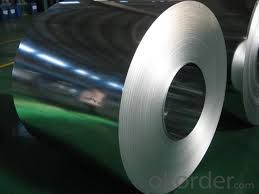
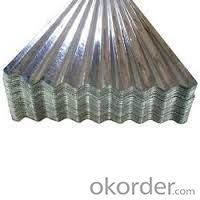
- Q: If rail ties were melted, would they be like any other type of steel?
- Steel okorder ... If care is not taken in the method used to melt the steel that alloy will change because the carbon will burn in the process. Also part of a steels rating is a result of heat treatments used. When melted it will loose those properties. By the way rail road ties are either wood or concrete- not steel.
- Q: How do steel coils contribute to structural integrity in buildings?
- Steel coils contribute to structural integrity in buildings through their strength and durability. By using steel coils in the construction of beams, columns, and other load-bearing components, buildings can withstand heavy loads, resist deformation, and maintain their stability over time. The high tensile strength of steel coils allows for the creation of lightweight yet sturdy structures, ensuring the overall safety and longevity of the building. Additionally, steel coils offer excellent resistance to corrosion, fire, and extreme weather conditions, further enhancing the structural integrity of buildings.
- Q: What are the common coil thickness and width combinations available for steel coils?
- The specific requirements and standards of the industry can cause the available combinations for steel coil thickness and width to vary. Nonetheless, there are commonly used combinations that can be found. There is a range of options for coil thickness, varying from thin to thick coils. Thin coils typically have a thickness of 0.4mm to 3.0mm, while medium thickness coils can be around 3.0mm to 6.0mm. Thicker coils can range from 6.0mm to 25.0mm or even higher, depending on the specific application. The coil width also varies depending on the intended usage. Common options include widths of 600mm, 750mm, 900mm, 1000mm, 1200mm, 1250mm, and 1500mm. However, wider or narrower coils can also be available depending on the specific requirements of the customer or industry. Ultimately, the most suitable combination of coil thickness and width will depend on factors such as the intended application, manufacturing processes, transportation limitations, and customer preferences. It is crucial to consult with steel coil manufacturers or suppliers to determine the most appropriate options for your specific needs.
- Q: What are the quality standards for steel coil production?
- The quality standards for steel coil production typically include factors such as dimensional accuracy, surface finish, mechanical properties, chemical composition, and adherence to industry-specific standards and specifications. These standards ensure that the steel coils meet the required strength, durability, and performance criteria, and are suitable for various applications in industries like automotive, construction, and manufacturing.
- Q: What are the different types of steel coil cutting blades?
- There are several different types of steel coil cutting blades, including shear blades, slitting blades, and rotary slitter knives. Shear blades are used for straight cuts and are typically made of high-speed steel or carbide. Slitting blades are designed for cutting coils into narrower strips and can be made of high-speed steel or tungsten carbide. Rotary slitter knives are used in rotary slitting machines and come in various configurations, such as circular or straight-edged blades, depending on the specific cutting requirements.
- Q: How do steel coils affect the quality of finished products?
- Steel coils can greatly impact the quality of finished products in various industries. One of the key ways steel coils affect product quality is through their dimensional accuracy and consistency. When the steel coils are not properly manufactured or have irregular dimensions, it can lead to issues in the production process and result in finished products that do not meet the desired specifications. Furthermore, the surface quality of steel coils is critical in determining the final appearance and performance of the finished products. Coils with surface defects, such as scratches, rust, or unevenness, can negatively impact the aesthetic appeal of the products, making them less desirable to customers. Moreover, these defects can also affect the functionality and durability of the finished products, leading to potential failures or reduced lifespan. The mechanical properties of steel coils also play a vital role in determining the quality of finished products. Coils with inconsistent or inadequate mechanical properties can compromise the strength, toughness, and overall performance of the end products. For example, in industries such as automotive or construction, where strength and reliability are crucial, the use of steel coils with the wrong mechanical properties can lead to safety hazards or structural failures. Additionally, the chemical composition of steel coils can significantly influence the quality of finished products. The presence of impurities or variations in the alloying elements can affect the material's corrosion resistance, weldability, and other essential properties. This, in turn, can impact the longevity and functionality of the final products. In summary, steel coils have a substantial impact on the quality of finished products. Their dimensional accuracy, surface quality, mechanical properties, and chemical composition all contribute to the overall performance, appearance, and durability of the end products. Therefore, it is crucial to ensure that steel coils used in manufacturing processes meet the desired standards to achieve high-quality finished products.
- Q: Why people prefer prefabricated buildings these days? Recently my friend has told me that he is going to owe a steel house so I was just thinking are these steel structures really durable and cheaper than concrete structures?
- Hi., I think steel is the best option for the building ..
- Q: How do steel coils contribute to energy efficiency?
- Steel coils contribute to energy efficiency in several ways. Firstly, steel coils are lightweight and can be easily transported, reducing the energy required for transportation. Additionally, steel coils have high strength-to-weight ratio, allowing for efficient use of materials in construction, which reduces overall energy consumption. Furthermore, steel coils have excellent thermal conductivity, enabling efficient heat transfer and distribution in various applications, including heating and cooling systems. Lastly, steel is a highly recyclable material, and using steel coils promotes the circular economy and reduces the need for energy-intensive production processes.
- Q: What brand steel tapes are of good quality?
- Personal feeling is also good for the Great Wall Seiko tape, upstairs several estimates are the production of steel tape manufacturers, of course, that their goods well. Our unit now buy all the Great Wall Seiko goods, said the tape is good, not because it is so durable
- Q: I want to replace the old refrigator within the next 6 months........ Is the trend to buy a stainless steel refrigerator? Some magazines and internet sites are pointing me that direction. What are the pro's and con's ? I like the color bisque, or cream-color as well, or better, than stainless steel. What would be the reasons to buy stainless steel...is it becoming the most popular color ?
- It's not about color necessarily. Stainless steel is easier to clean and for the most part scratch resistant. It's easier to take care of.
Send your message to us
Hot DIP Galvanized Steel Coils Regular 1000mm 1200mm 1250mm
- Loading Port:
- China main port
- Payment Terms:
- TT OR LC
- Min Order Qty:
- 25 m.t.
- Supply Capability:
- 1000 m.t./month
OKorder Service Pledge
OKorder Financial Service
Similar products
Hot products
Hot Searches
Related keywords
